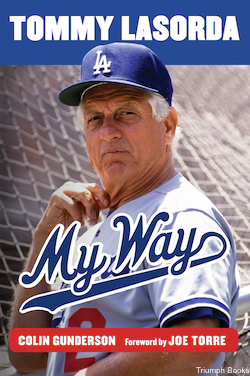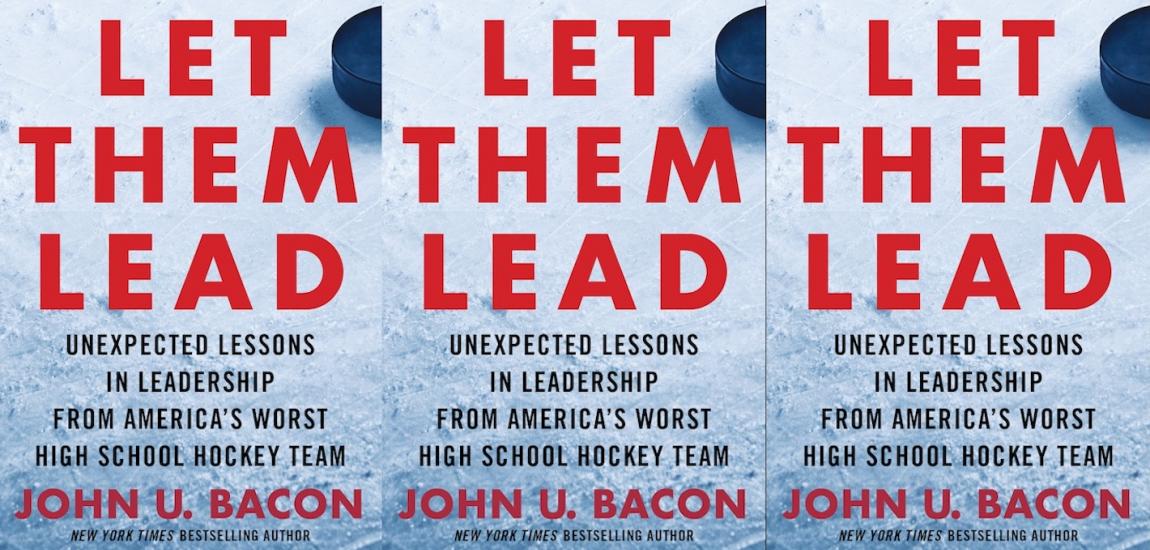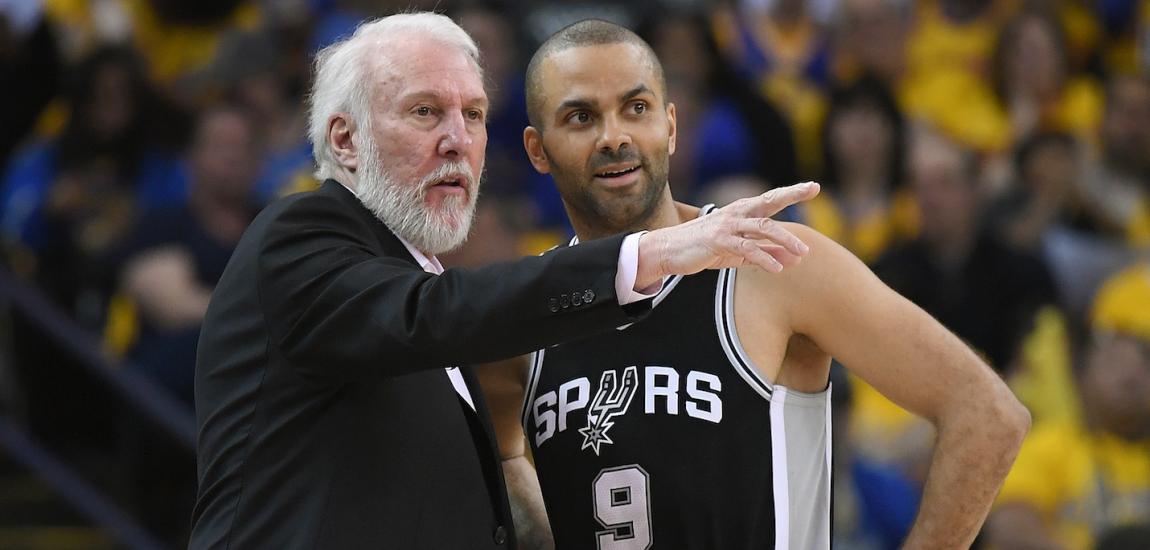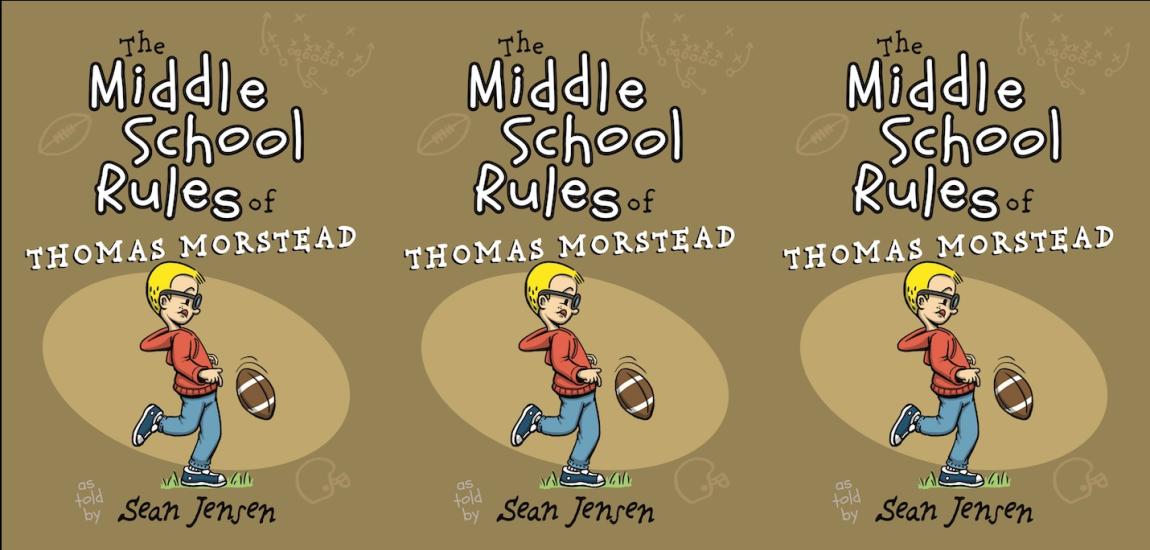In Tommy Lasorda: My Way, author Colin Gunderson covers Lasorda's days as a player and manager of the Los Angeles Dodgers, including World Series championships in 1981 and 1988. It also reveals what makes Lasorda tick: His relationship with his father, Sabatino, whom he emulated; his childhood growing up in Norristown, Pennsylvania, working odd jobs; and his unfailing work ethic. This excerpt looks at some international intrigue from Lasorda's meeting with Fidel Castro at the start of the Cuban revolution to his leading the U.S. baseball team at the 2000 Olympics in Sydney.
Tommy and his brothers would all serve their country in the military. All of the Lasorda brothers loved America. Wherever Tommy went, he took his patriotism with him. As a young player he would frequently play during the winter in Panama, Puerto Rico, Venezuela, Colombia, and Cuba. American tourists loved vacationing in Cuba, and American players loved playing in Cuba, including Tommy. He pitched for Marianao and Almendares, on which he was teammates with the great Willie Mays.
"The Cuban people were wonderful. They loved baseball," said Tommy. "Jo and I were walking down the street in Havana and a kid had a puppy. I traded him a baseball for his dog. The fans would sing and dance in the stands. We loved Cuba. George Raft was running the Capri Hotel. Every Sunday we would go to the hotel, and George would have a table for us to see the show. He would feed us dinner, and then he would dance with our wives. He was a great dancer, and a movie star."
Cuba had always been a wild place. During one game Tommy pitched, he got into an argument with Amado Maestri, the umpire behind the plate.
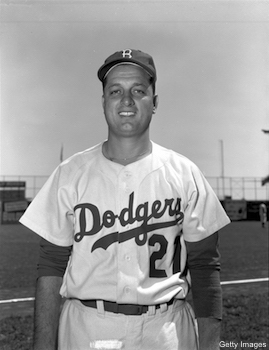
"Tom Gorman, who was an American umpiring in Cuba, had told me to be careful because the umpire behind the plate was packing. I threw three curves that I thought were strikes but he called as balls,” said Tommy. ‘You’re the worst umpire I’ve ever seen! How can you call those balls! You should be ashamed of yourself!’ He unbuttoned his coat and right there tucked in his waist was the biggest pistol I had ever seen. 'Maestri, you're the best umpire I've ever seen!'"
Amazingly, Tommy was twice in the country when the government changed hands. While playing for Marianao, he saw Fulgencio Batista overthrow Carlos Prio in 1952 and Fidel Castro overthrow Batista in 1959.
"On New Year's Eve 1958, Jo and I were with Art Fowler and his wife and Bob Allison and his wife,” said Tommy. “We were leaving a party at about 3:00 am when three large planes flew low overhead. I wondered who would be flying that late at night. I found out later that it was Batista and his cabinet fleeing the country."
Tommy and his wife were confined to their home in Club Nautico, an exclusive resort on the beach. "When Castro overtook the city, we thought he was going to come get this guy who owned Club Nautico," said Tommy. "He was a member of Batista's cabinet, and we thought they were going to destroy the place. We got word they were coming, so we confiscated whatever weapons people had in their homes. We patrolled all night. They came to the gate and we were ready for them, but they changed their minds and left.
"The city was shut down. Castro sent a police car to pick me up. Howie Haak, a scout for the Pirates, came with me. We got in the car and we got to the hotel, and they took us up to the penthouse. Fidel was there waiting for me. He wanted to talk baseball. We spent an hour and a half talking about the game."
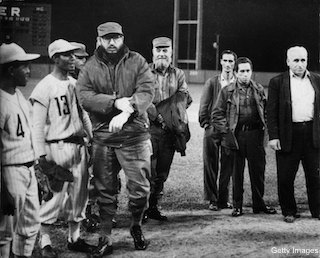
Despite the civil strife, Cubans loved baseball. The grandstands of the Gran Estadio de La Habana were packed with 10,000 fans enjoying Hatuey beer, chicharrones, and cigarros, ready for some action. "The first game back after the strike I was going to pitch," said Tommy. "There were barbudos everywhere with guns over their shoulders. One of them was warming me up! I waited until the catcher came out and the barbudo went back to the dugout.
"It was a sad situation for the country. When Castro came in, the people were celebrating because they thought he would be good for the country, and so did I. We had a general manager, Monchy de Arcos, and he told me that Castro was not a good man, that he was a communist. I thought when he took over that he would be a savior for the country. I found out I was wrong. I wanted to get out of there, but we continued playing baseball after the strike was over. It was a gorgeous country, until Castro took over."
Castro dismantled the existing baseball league and rebuilt Cuban baseball into a powerhouse that would dominate international tournaments over the years. Cuba won the Pan Am Games 12 times; America's single victory came in 1967. Baseball was only an exhibition/demonstration sport in the Olympics until 1992; between '92 and 2008, Cuba won the gold three times and the silver twice. America's only Olympic gold came in the 2000 Games in Sydney, Australia. That team was managed by Tommy.
After retiring from the Dodgers in 1996, Tommy made known his interest in managing the next Olympic team. While there were many worthy candidates, no one else had a plaque hanging in Cooperstown or two World Series rings. No one else had 1,599 major league wins in their record. No one had developed as many minor-leaguers into big-league stars as Tommy had.
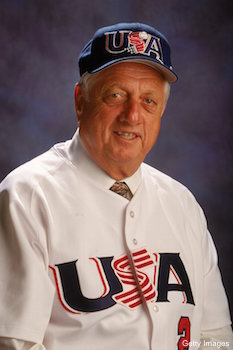
Being out of the dugout for a few years had Tommy missing his life's work. He missed the camaraderie, the game strategy, the competition, and the glorious spoils of victory. When asked why he wanted to return to managing for the Olympics, he said, "I wanted to beat the Cubans." As he told Jo, "There’s going to be a quiz 25 years from now asking which manager won a World Series and a gold medal for his country. That manager will be me!”
"You don't even know the players," she countered.
"I don’t care, just as long as they are alive."
“Everybody was saying we couldn't beat the Cubans,” Tommy said. "Everyone said that they had won every existing tournament and that they couldn’t be beaten. I asked if they had ever lost a game before, which they had. Well, they are going to lose again."
On May 5, 2000, at a press conference in Los Angeles, Tommy was given the opportunity to do just that for his country. At the press conference, he said, "It is a privilege and an honor to represent the greatest country in the world at the Olympic Games. I have managed World Series champions and other great teams, but this means more, because this time I’ll do so on behalf of my country."
Tommy wasn't the only professional that would be representing America in the Olympics. In past years, international tournaments were reserved for amateurs only, a rule that was also a source of Cuba’s success. However, for the 2000 Games, the rules had been changed and professionals would now be allowed to participate.
Before players could be contacted to gauge their interest in playing in the Olympics, the general managers of each team were asked for permission.
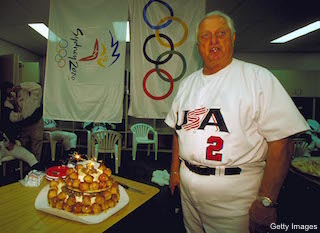
As Olympic baseball was played in September, they coincided with major league rosters expanding from 25 to 40. As a result, most minor league stars and blue-chip prospects were unavailable to Tommy. Of the 24 players on the final roster, only one of them had played in the big leagues at that time.
"I only knew one player,” said Tommy. "Pat Borders, our catcher, had played for Toronto for many years, and he was the only guy I knew."
When they assembled for the first time as a team for their only workout before leaving for Sydney, Tommy addressed them. "I don’t know who you are or where you came from," he said. “I don’t know if you’re married or single, if you're good, mediocre, or bad. But I'm going to tell you something right now. When this thing is all over, the whole world is going to know who you are. You want to know why? Because you are going to bring the gold medal in baseball back where it belongs, in the United States of America!
You do not represent your family, you do not represent your hometown, you do not represent your school or the organization that signed you. You now represent the United States of America, and the only thing you are going to do over there is win! You want to know why? Because baseball is America's game! It doesn't belong to the Japanese or the Koreans or the Italians or the Cubans. It belongs to the United States of America! We are not going 6,000 miles to lose!"
The tone had been set. Just as Tommy had let his expectations be known to his Dodgers teams, he had let his expectations be known to the young players on Team USA. Just as he had instilled confidence in his players from Ogden to Los Angeles, he did so with his Olympians.
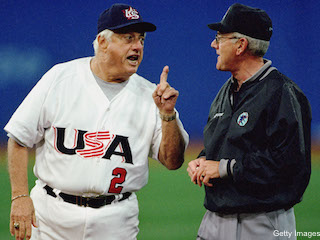
For a bit of extra motivation, Tommy called in a favor. After his speech, the team huddled together around a phone. On the other end of the line was the Splendid Splinter himself, Ted Williams. Tommy had arranged a call with his old friend to reinforce the importance of their cause. Williams’ historic career was interrupted twice when he served as a Marine pilot in World War II and Korea. "He told them how to conduct themselves, how to win, to play as a team and not as an individual,” said Tommy. "I was going to take him over there with us but I couldn’t get a plane that he could sleep on. He was willing to go."
“I couldn’t believe that was him,” said first baseman Doug Mientkiewicz. "We were all tremendously grateful that Tommy did that for us. He's like Gandhi -- everybody loves Tommy. People in the world who have never watched baseball know who Tommy Lasorda is, and to say I had the chance to play for him is an honor."
When Team USA arrived in Sydney, the players had to clear customs and then board another flight for the Gold Coast. They would be there for 10 days, working out and playing exhibition games. The workouts and games gave Tommy a chance to see what tools his players had. In typical Tommy style, there would also be meals and walks around the hotel together. I would take Kurt Ainsworth and Ben Sheets out for a walk," said Tommy. "We would talk about baseball, about pitching, how to pitch, how to set up hitters, how to pitch to the count. All of those things become very important to a pitcher. It was a way for me to get to know my players and relate to them.
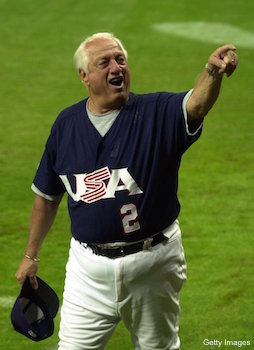
"I wasn't staying in the Olympic Village. I was at a hotel, but I would go over there early every morning, have breakfast with the team, have the workout or play a game, have dinner with the team, and then go back to the hotel around 11:00 pm and come back the next day at 6:00 am. I wanted to be with them all the time."
For Tommy, the Opening Ceremonies was a moment he'll never forget.
"I had tears in my eyes," said Tommy. "I had a pair of brand-new shoes on. They call you out in alphabetical order, so the United States was close to the end. I'm standing there for three hours with these shoes that are too tight, it was hot. But was it worth it? When we walked out there it wasn’t just the baseball team, it was all the U.S. athletes, men and women who work hard for years to participate in the Olympics, and all the hours they put into it, the desire that they had, and when you put USA on the front of their shirt, it’s a big deal."
-- Excerpted by permission from Tommy Lasorda: My Way by Colin Gunderson. Copyright (c) 2015. Published by Triumph Books. All rights reserved. No part of this excerpt may be reproduced or reprinted without permission in writing from the publisher. Available for purchase from the publisher, Amazon and Barnes & Noble. Follow Colin Gunderson on Twitter @colingunderson.

